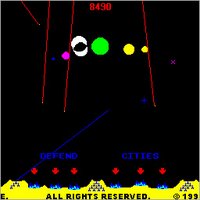The End of the World
 DON'T PANIC. This has nothing to do with the Apocalypse. This is about something called "the end of the world effect", which I will abbreviate as EWE. It is a phenomenon commonly applied to wargames, but is also present in euros.
DON'T PANIC. This has nothing to do with the Apocalypse. This is about something called "the end of the world effect", which I will abbreviate as EWE. It is a phenomenon commonly applied to wargames, but is also present in euros.EWE occurs at the end of a game. In order to achieve a winning position/condition, players will often find themselves doing something "silly" or otherwise not in keeping with the game's theme or natural flow.
In wargames it's particularly obvious because your actions are more often grounded in reality. For example, you are playing an ASL scenario which requires the Germans to occupy a set of buildings by turn 5 in order to win. You advance your units carefully, pushing back the American defenders, using the buildings and terrain to your advantage, not exposing yourself when you would be mowed down. Suddenly, it's turn 5. You didn't make as much progress as you expected during the previous couple of turns. The only way to win is to get at least 2 units across the street alive.
The chances of any given unit making it are small, but you have 10 of them. One after the other, you run each unit across the open ground, using up the defender's firing opportunities, running through residual fire, watching the Desperation Morale counters pile up on broken half squads like graves. In the end, 2 units barely make it, and you win.
Victory feels a little hollow. You just lost (or lost control of) most of your units in 2 minutes. The 2 units occupying the buildings would surely not be able to hold if the game continued for even a single additional turn. Yet this is the way of things at the end of the world.
In euros, it doesn't feel so bad. Players are implementing mechanics to achieve a victory. You aren't really doing anything realistic, are you? Yes and no.
Even in euros, there's a sense of flow. There's an economy of resources, supply and demand, ebb and flow, etc. And there's often a theme of some kind which attempts to match up the mechanics with some real-world or fake-world activity. Even in these cases, EWE rears its head.
In Power Grid, you won't buy extra fuel on the final turn unless you are trying to screw another player out of it cheaply. Once you have sufficient power plants to power 17 (or whatever) cities, you will not buy new ones.
In St. Petersburg, players will use up all their remaining cash to buy Nobles and Noble Upgrades to squeeze out a few (!) extra VP.
I suppose EWE is generally considered a bad thing. One of the only solutions is for a given game to be part of some larger "campaign" so that the left-overs get carried over. This provides incentive to not do silly things. Of course, in euros this does not work.
What euro games have the worst EWE?
What euro games that could have bad EWE mitigate it best?





3 Comments:
I haven't played it in a while, but I recall that Serenissima had a major endgame problem. It was simple to mitigate it with house rules, at least. IIRC, the (common) house rules we used were to both vary the ending turn (based on a die roll) and making sailor worth victory points, so they aren't wasted in end-game attacks.
http://www.boardgamegeek.com/geeklist/2290
http://www.boardgamegeek.com/geeklist/2289
http://www.boardgamegeek.com/geeklist/2290
http://www.boardgamegeek.com/geeklist/2289
Post a Comment
<< Home